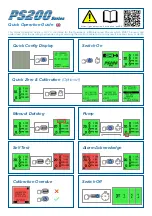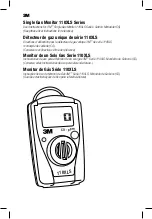
FIRE
R M LD
FIRE
R M LD
Operator’s Manual
26
GAS LASER
Doc No. 16162 Rev A, GAS LASER Operator Manual
© 2021 Teledyne Gas Measurement Instruments Ltd. All rights reserved.
WARNING: The visible green Spotter
laser is a Class 2 (II) laser product.
WARNING: Do not stare
into beam or view directly
with optical instruments.
WARNING: Avoid direct
eye exposure to the laser
and do not point in the
direction of others. Visible
and Invisible Lasers are deployed
by this instrument.
WARNING - The Gas Laser is
capable of scanning through
windows to possibly detect methane
gas. However, scanning through
windows is not guaranteed. False
positives and negatives may occur.
AVERTISSEMENT : Le Laser de
repérage vert visible est un produit
laser de classe 2 (II).
AVERTISSEMENT : Ne jamais
fixer le faisceau ni le regarder
directement avec des instruments
optiques.
AVERTISSEMENT : Évitez
l’exposition directe des yeux au
laser et ne le pointez pas vers
d’autres personnes. Des lasers
visibles et invisibles sont déployés
par cet instrument.
AVERTISSEMENT : Le Gas Laser
est capable de balayer les fenêtres
pour éventuellement détecter du
méthane. Cependant, le balayage
des fenêtres n’est pas garanti. Des
faux positifs et des faux négatifs
peuvent être obtenus.
Scanning With The Gas Laser Instrument
Refer to your company’s specific training and procedures for being qualified for leak surveying.
Detection Through a Window
· Do not aim straight into a window.
Keep to an angle and sweep
across the window slowly.
· The laser may not penetrate certain
window types effectively, such as,
tinted, double pane, stenciled, etc.
· If there is no gas reading indicated
do not assume there is no gas
within the structure, ie. houses
office buildings. Continue scanning
common venting points.
NOTICE: Spotter laser is about 1.25”
to the right of the IR laser beam.
NOTICE
The first thing you will need to learn when scanning with the
Gas Laser is to control the aiming of the laser and rate of
sweeping. Radical or abrupt motion may cause false detec-
tions due to rapidly changing distance or background that the
laser detects. Radical or abrupt motion may cause the IR beam
to not thoroughly scan the area. Here are a few tips for scanning:
Common Venting Points
The Gas Laser may be used to scan any structure or place that has gas service.
Some of the common venting points of a house are shown below.
Dead
Vegetation
Chimney
Windows
(Across Surface
& Around Edges)
Doors
(Under/Around)
Main Line
Main and
Service Lines
Foundation
& Crawlspace
Plumbing Vent
Soffit Vents
Under Eaves
Meter
Roof Vent
AVERTISSEMENT
WARNING
1.
Gas plume concentration and
size must be greater than the
alarm level of the instrument.
2.
Infrared beam must pass
through the plume.
3.
Background target
(i.e., ground, building, etc.) must
reflect the infrared beam back.
In order for the Gas Laser to detect gas, three conditions






































